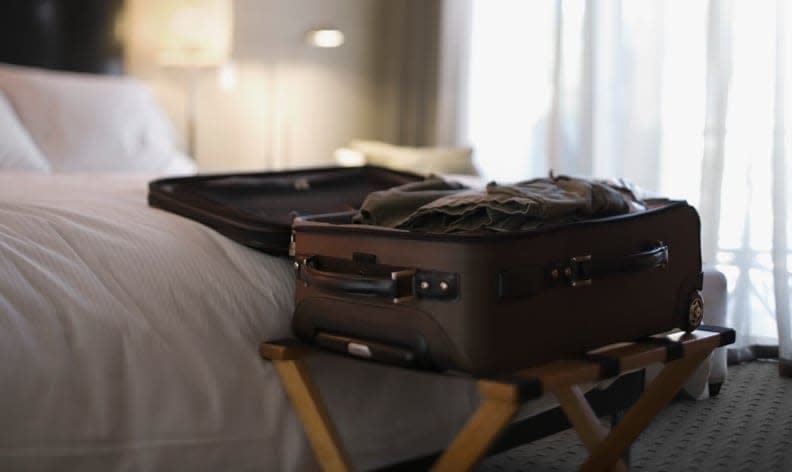Don't bring bedbugs back home: How to avoid the bloodsuckers while traveling
From hotels to trains and Airbnbs, bedbugs are being documented across Paris. Even Paris Deputy Mayor Emmanuel Grégoire posted on X, formerly Twitter, this month that “no one is safe.” Just uttering the name of these easy-spreading critters can cause stress to many.
News of the infestation may scare some travelers to reconsider their travel plans to Europe, but the good news is that you don’t have to rebook your trip, says Dr. Chow-Yang Lee, entomologist and professor at the University of California, Riverside.
“It’s not something we should be overly concerned about,” Lee told USA TODAY. “They are there and they will continue to be there tomorrow. As travelers, we just have to be extremely careful not to bring them home.”
Bedbugs can’t really hurt you: But your fear of them might, experts say
Over the past 20 years or so, infestations of the tiny bloodsucking critters have been prevalent around Europe, Australia and the U.S.
“With regards to bedbugs, it is not just going to Paris but particularly even traveling within the continental U.S., you’re always at risk,” Lee said.
Here’s how bedbugs could affect your travel plans.
Check your accommodations
According to Lee, a five-star rating doesn’t necessarily mean your hotel will be free of bedbugs, which like to hide in the seams of sofas and mattresses and in the crevices of bed frames, headboards and dressers.
“It's not just the type of hotel that you’re staying at. Some people are like, 'If I stay in a motel, chances are there will be bedbugs,'” he said. But cleanliness doesn’t determine whether an infestation can occur, according to the Centers for Disease Control and Prevention website.
If you’re traveling to Paris, contact your hotel to check whether bedbugs have been found at the property.
As soon as you arrive at your room, hold off on unpacking and check for any signs of bedbugs, Lee said. Pull the sheets off the bed and lift the mattress if you can, looking out for any tiny black spots, which are bedbug feces or their exoskeletons. If you find something, which is probably rare but still possible, ask your hotel to move you to a different room.
Protect your home
It can be a huge headache if you bring bedbugs back home from your trip, so it’s important to be diligent when you return, Lee said. Bedbugs can live for up to three months without a meal.
The first thing to do is leave your luggage outside the house. Immediately put all your packed clothing – even what you didn’t wear – in a garbage bag and tie a knot to seal it. When you have time, remove the clothes from the garbage bag and let them tumble in the dryer with heat for a good 30 minutes to kill any of the critters and their eggs.
Then it’s time to clean your luggage itself. If it’s a duffel bag, throw it in the wash if you can. Otherwise, use a garment steamer to kill off any stowaway bugs.
Where do bed bugs come from? Here's how they get in and how you can check for their presence
How do I know if I have bedbugs?
Bedbug bite reactions are a surefire way to tell if you’ve encountered bedbugs. Unfortunately, reactions vary among people, Lee said. Some people will see their bites in as soon as an hour, and others won’t have any reaction at all. Seeing bite marks or evidence of them in the space are the best way to know, according to the CDC.
Besides the irritating skin swelling you may get, bedbug bites are relatively harmless, and they don’t transmit diseases, Lee says.
What should I do if I have bedbugs in my accommodations?

Contact your hotel management or rental host as soon as possible, Stan Sandberg, co-founder of TravelInsurance.com, told USA TODAY.
“Most hotels will have experience with bedbugs and likely have a protocol in place,” he said. “If confirmed, the hotel will need to relocate you to a clean room and also assist in getting your clothes and personal belongings cleaned.”
He added that it wouldn’t be “unreasonable” to request additional compensation like a discount on your room rate or other amenities to make up for the inconvenience – and the stress.
How do you get bed bugs? Here's where you might have gotten them from.
Will travel insurance cover bedbugs?
Yes, depending on the plan.
Some travel insurance plans have a “Travel Inconvenience” benefit – which could have coverage of $250 per insured person for a total of $750 – for those unfortunate inconveniences such as a closed golf course, cruise diversion or hotel infestation, Sandberg said. So, for example, if you have to move to a different hotel, you and your travel guest would each get $250 if you’re both insured.
Kathleen Wong is a travel reporter for USA TODAY based in Hawaii. You can reach her at kwong@usatoday.com.
This article originally appeared on USA TODAY: How to prevent bedbugs while traveling